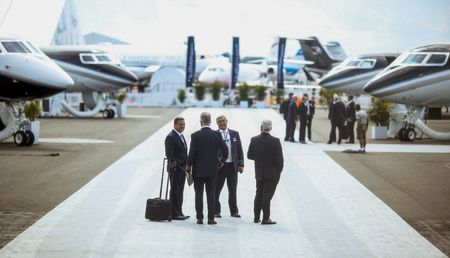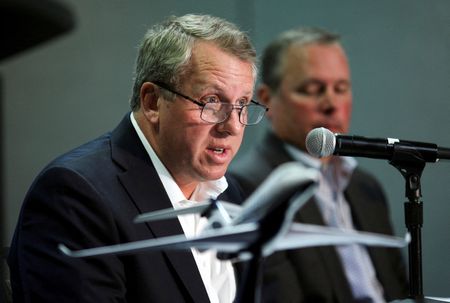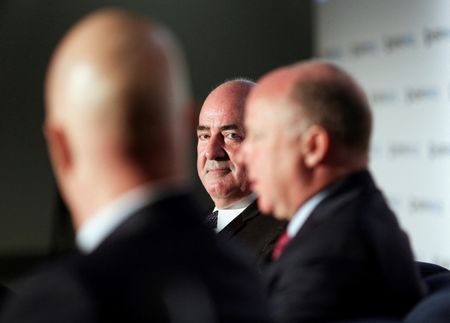By Allison Lampert
ORLANDO, Fla. (Reuters) – The shortage of parts from chips to windshields that has held back plane production will run into at least 2023 – and manufacturers are spending more to tackle the problem, aerospace executives said.
Manufacturers are ordering material as far as two years in advance – a break with just-in-time models used previously to restrain costs – and dispatching specialized staff to keep production lines running, executives said at the world’s largest business jet show in Orlando, which ended on Thursday.
However, parts shortages are expected to continue dogging U.S. planemakers and large aerospace suppliers, which report quarterly earnings next week.
Supply-chain disruptions cost aerospace and defense companies an average of $160 million in lost revenue for the prior year, according to a first-quarter survey of aerospace companies, said Jennifer Bisceglie, chief executive of supply- chain risk management company Interos.
Executives from Honeywell International Inc, Textron Aviation and General Dynamics Corp’s Gulfstream Aerospace told Reuters at the National Business Aviation Association show they are taking greater steps to back suppliers.
Vipul Gupta, vice president and general manager of Honeywell Aerospace Avionics, said his division is ordering parts two years out, compared with previous lead times of roughly 60 days to 10 months, depending on the component.
For simple avionics components, lead times have increased to roughly one year, compared with 90 days in the past. Honeywell makes products like avionics and engines for business jets and flight management systems for commercial jets.
“The story is very simple: getting our forecast right and putting the demand in front of our suppliers a lot earlier,” Gupta said. “It provides a very clear picture for our suppliers on what they need to deliver.”
Gupta said his division would support European planemaker Airbus SE’s longer-term production goal of 75 A320 family jets a month in 2025, up from around 50 in 2022. Some manufacturers have questioned whether a battered supply chain could keep up with the target.
“If they want to execute 75, we will execute 75,” he said.
Smaller suppliers, struggling with higher costs and labor shortages, are pushing manufacturers to order many months in advance to assuage concerns over a possible economic slowdown.
But ordering earlier also means making payments sooner, raising working capital, and delaying when manufacturers can recoup expenses on the plane or part’s delivery.
ROBUST ORDER BOOK
To mitigate additional costs, some private planemakers are asking customers for larger deposits on jets before delivery, said one corporate planemaker executive who asked not to be identified.
Business aviation rebounded faster than commercial traffic in the United States last year as wealthy travelers opted to fly on private jets and avoid crowded airports during the height of the COVID-19 pandemic.
Gulfstream Aerospace orders roughly six months to a year out, compared with a previous “just in time” strategy, President Mark Burns said.
Burns said the company’s robust order book has more than offset any possible impact on working capital.
Longer lead times also add an additional risk of unwanted inventory in the event of a downturn, analysts say.
“The longer lead times stay high, the more of a risk to earnings in our view,” Bank of America Global Research analyst Andrew Obin said.
That has companies supporting constrained suppliers with advice and staffing like machinists and engineers, often at the same time.
“The only caveat is if we send you help, you have to work on our stuff first,” said Ron Draper, president of Cessna business jet maker Textron Aviation in an interview.
“We’ve been at some of these suppliers and we see a lot of other OEMs in the visitor logs.”
Still, Gulfstream Aerospace’s Burns and others are more optimistic about supplier performance with deliveries getting closer to the desired dates.
“We’ve kind of plateaued and will see improvements into 2023.”
(Reporting by Allison Lampert in Orlando, Fla.; Additional reporting by Rajesh Kumar Singh in Chicago and Abhijith Ganapavaram in Bengaluru; Editing by Kevin Krolicki and Matthew Lewis)



